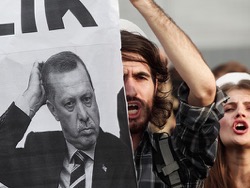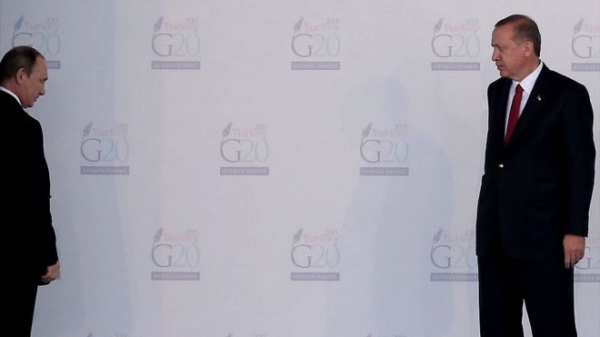Turkey wants to change the borders: Erdogan scolds Ataturk and the Treaty of Lausanne
Publication date: 30 September 2016, 20:45
Ankara again in the area of historical and geopolitical risks

Speaking to the heads of rural administrations in Ankara, President Recep Tayyip Erdogan criticized the Lausanne peace Treaty of 1923 on the basis of which was defined the modern borders of Turkey. “They (opponents of Turkey in the First world war — S. T.) drove us to the signing of the Treaty of Sevres in 1920 and was persuaded to sign the Treaty of Lausanne in 1923. Someone tried to deceive us by presenting the Treaty as a victory, said Erdogan. But everything is clear. In Lausanne we gave the Greek Islands in the Aegean sea, the cry which is heard on our shores. There’s our mosque and our Holy places. We are still fighting for shelf. These problems arose because of those who sat at the table in Lausanne and could not defend our rights.”
Erdogan’s words about the Lausanne peace Treaty of 1923 caused a very sharp reaction in Greece. Greek foreign Minister regarded them as an attempt to question the border between the two countries and claims to the Greek Islands. Athens has acted with the special statement in which has demanded from Turkey to respect the agreement of 1923. “The Treaty of Lausanne and the international law are a reality in the civilized world, and no one, including Ankara, can not admit. All have to respect him. As morbid as it may seem” — emphasizes the Greek diplomatic sources. Their estimates given and all Greek political parties, in the General opinion of which “Erdogan’s words are dangerous, are an integral part of systematic efforts of the Turkish government to question the sovereign rights of Greece on the Aegean Islands”.
Judgment and insights of the Turkish President in need of analysis as it is based on the historical nuances, which the historians of Turkish, Western and Russian — for various reasons, did not pay decent attention. Starting to shape the course of events in their chronological sequence, but not the mosaic. The problem here is not only in “nostalgic pain” of modern Ankara for the lost Islands in the Aegean sea”, although that too. Recall that in December 2013, Erdogan, as Prime Minister, have said that Turkey belongs to the Western Thrace (part of Greece), Macedonia, Bosnia and Herzegovina, thus triggering an international diplomatic scandal. 11 January 2016, Fragoulis Fragos (2009 to 2011 chief of the General staff of the Armed forces of Greece, in 2012, the acting Minister of defence) stated that “the Turks want to change the borders in the Aegean sea and return under the authority of the Ankara part of Northern Greece down to Thessaloniki, Cyprus, to spend a redistribution of Maritime boundaries in the Aegean sea”. This is not news. From time to time between Turkey and Greece jumped out and popping out the contradictions on the issue of waters of the Aegean sea, continental shelf, air space, national minorities, Cyprus problem, the Islands of Imros and Tenedos.
Who this time aimed political arrows Erdogan? The Turkish media interpreted his statement after all, not as an attempt to cause a political scandal with Greece, but as a hidden, but sharp criticism of the policy of the founder of the Turkish Republic, Mustafa Kemal Ataturk. Let’s start with the fact that on 23 April 1920 in Ankara, the Turkish national movement led by Kemal, established the Grand national Assembly of Turkey (TGNA). Earlier, the Sultan Mehmed VI dismissed in the Constantinople Parliament, the General Assembly of the Ottoman Empire, leaving only a government with the Entente and joined them Italy, Japan, Belgium, Greece, Poland, Portugal, Romania, Kingdom of Serbs, Croats and Slovenes, Hejaz, Czechoslovakia and Armenia signed in August 1920 the Treaty of Sevres, which meant not only the division of the Ottoman Empire, but also the act of surrender in the First world war.
Since then, the country has actually started a civil war between the government of Constantinople, formed the so-called “army of the Caliphate and the army of the TGNA. The Sultan was supported by Britain and its other allies. In this situation, he decided not to ratify the Treaty of Sevres, although by all indications this could be a result of some agreements between Ankara and Constantinople. March 16, 1921, the RSFSR, with Kemal signed the Treaty of Moscow, according to the Commissariat of the RSFSR Georgy Chicherin, “was the only European state to recognize the government of the Grand National Assembly of Turkey and the boundaries established National Turkish agreement.”
At the end of September 1922 at a meeting in Paris of the Prime Minister of France R. Poincare, Minister of foreign Affairs of England Lord Curzon D. and the Ambassador of Italy in France, K. Sforza, it was agreed to convene in Lausanne conference to determine the future of the Ottoman Empire. The invitation to the conference in Lausanne was referred to as the Sultan’s government in Constantinople and Ankara. In response, Kemal November 1, 1922, carried through the Assembly the decision on the announcement of the government in Constantinople to be illegal, thus abolishing the Sultanate, not the Caliphate. November 11, 1922 conference in Lausanne “suddenly” decided to recognize the sovereignty of the Assembly, and then on November 17, 1922, the last Sultan Mehmed VI left Constantinople.
By the way, there is evidence that the Sultan was aware of the British political and geopolitical conditions offered by the allies at Lausanne, the government of Kemal. Mehmed VI believed them after the Treaty of Sevres, 1920, the second capitulation of the country in the First world war and refused to put his signature under them. Note another important point. On 20 November 1922 in Lausanne, opened the conference, it became clear that it is attended by the representatives of Britain, France, Italy, Turkey, Greece, Yugoslavia, Bulgaria, Romania, and Japan. The United States sent only observers, and representatives of Soviet Russia in General is not allowed.
It was the fact that in London believed that the Bolshevik Moscow, guided by the principles of world revolution in the East”, will be imposed against Kemal requirements and will insist on control of Ankara major parts of the territory of the former Ottoman Empire. It is enough to read Soviet diplomatic correspondence of the time, to ensure that Moscow had information about the secret agreements of London with the head of the Turkish delegation Ismet Pasha as to whether to allow Soviet Russia to that part of the talks, which will decide the fate of the Turkish Straits. So when Erdogan says that many problems have arisen because of those who sat at the table in Lausanne and could not defend our rights,” he is not very far from the truth.
Isolating in Lausanne, the Turkish delegation from Moscow, the head of the British delegation Curzon formulated articles of the Treaty on the part of the territorial issues. On 23 July 1923 the Treaty was signed. He stopped the war between Turkey and Entente powers. “Territorial article” the Lausanne peace Treaty (2-22) established the new borders, legally making thereby the collapse of the Ottoman Empire and Turkey fixing its present borders. Designing the collapse of the Ottoman empires in the West wore a baby character. On the territory of the former Empire, a number of States mandated territories of Britain and France (Iraq, Jordan, Syria, Lebanon, Palestine and others).
More recently, the Lausanne peace Treaty Turkish official historiography was evaluated as “a great victory”, indicating the international recognition resulting from the Kemalist revolution, an independent Turkish state. But now everything goes to the fact that these pages of the national history of the country will be rewritten. According to well-known British historian Norman stone, Turkey is trying to seek an explanation of the current situation in which it appears, in its history, referring to the victories or mistakes their former rulers. But the story, as you know, is useful not only to study but also to extract from it the necessary and important lessons. Whether it will turn out that the President Erdogan, at least for some risks, which for the first time since the First world war, so clearly once again hanging over the country?
Stanislav Tarasov, a REGNUM








